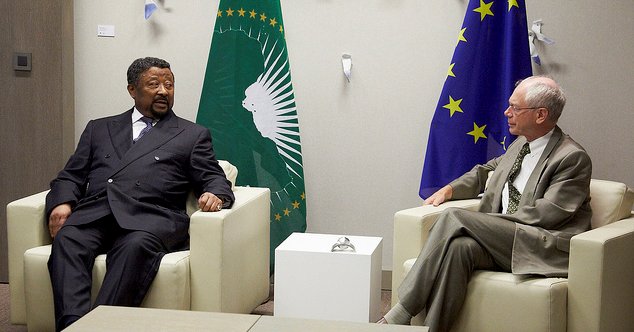Since the 1990s, regional cooperation has regained strength in both continents along the Mediterranean Sea. While Europe was ratifying one of the major treaties of its creation in Maastricht, African leaders committed to create a new common market for Africa before 2025. Even if economic integration and the creation of a free trade area were part of the major objectives in Europe and Africa, the European Union and the African Union have extended these objectives to many other areas.
It must be said that regionalisation has not reached the same level of accomplishment over both continents. The European Union has a common currency, issues laws which apply to all its citizens and ensures its presence in most international organisations. The African Union, created in 2002, still has to set up many of its institutions, and must coexist with eight sub-regional institutions which have various ambitions and unequal successes. Nevertheless, it must be admitted that these continental institutions are an essential element to be taken into account in order to try to understand the logic and the dynamic of each continent.
Two gradual integration models, aware of national realities
Those who criticised European federalism and pan-Africanism accused their defendants of failing to consider the local and national realities of each state. However, there was never any intention to ignore them. The European Union has constantly been focusing on taking cultures and national particularisms into account, without trying to erase them. With regards to the leaders of the African Union, they are fully aware that many problems can only be solved between states.
The European Union and the African Union have never had and will never have any other objective but to deal with issues going beyond state borders. Yet, in the future, many questions will require taking action beyond traditional local disparities without ignoring them.
Thus, the success of Europe and Africa as united entities will also depend on their ability to understand and handle local differences. In Africa, hundreds of ethnic and minority groups live together for better or worse. In many regions which have gone through major conflicts such as Rwanda, the Ivory Coast and South Africa, national reconciliation is sometimes only a dream, and at best a remote prospect. On the other side of the Mediterranean Sea, the birth of a European people seems to vanish as national tensions worsen. However, should this stop federalist wishes in Africa or in Europe?
Is regional integration a requirement for the 21st century?
While Europe and Africa are only middle-ranking powers, national governments progressively become aware of the scope of the issues which could successfully be dealt with on a continental scale. If Europe wants to compete with America and Asia thanks to its potential for innovation, research and production, only a European industrial and research policy can carry out these ambitions. In Africa, most of the ethnical and armed conflicts do not stop at the borders, as evidenced with the disastrous humanitarian situation in the Democratic Republic of Congo and in Mali.
In such a context, it seems that the relation between the European Union and the African Union will be essential to deal with these issues, much more than the traditional bilateral relations between states. Many questions arise and should be answered on a transcontinental level. Migration, peace and internal security, piracy and the environment are only some of the questions discussed which should not be affected by a standstill because of some states, or by a unilateral and counterproductive settlement decided by a small group of states.
Africa now counts one billion inhabitants. It is worn down by armed or political conflicts, a humanitarian situation which is sometimes precarious and the usual problems related to governance, education, access to water and health. Europe has a major role to play in the future restructuring of the African continent, not only by imposing decisions or by providing the traditional development assistance, but by giving momentum to an ambitious policy.
In order to do so, some European states will have to abandon their traditional policies towards Africa to engage in an intercontinental dialogue. On this issue, France is an eloquent example. Paternalism which characterised French governments and epitomised through Françafrique, may have caused more damage than it brought benefits to French-speaking Africa and the whole continent. On the contrary, relations between the European Union and the African Union have not been modified by several decades of colonialism and could represent, in the long term, the basis for mutual and productive dialogue.
The United States of Europe imagined by Jean Monnet, or the United States of Africa advocated by Colonel Gaddafi when he was the leader of Libya, may not appear before a long time. However, if Europe can establish an equal cooperation, based on the acknowledgement of well understood interests, the strengthening of ambitious diplomatic relations and the sharing of universally recognized values, it will be with Africa.
The coming decades will allow us to determine whether Europe will seize this unique opportunity. If so, Europe and Africa may not only be partners, but also political allies. Pragmatism must prevail today, but hope is nonetheless vital, for both Europeans and Africans.


Follow the comments: |
|
